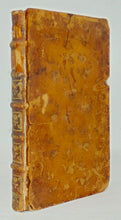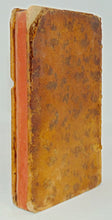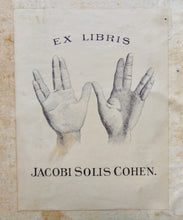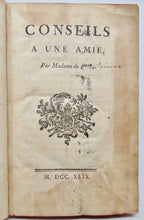
Madame de Puisieux. Conseils a Une Amie, Par Madame de P. with bookplate of Jacobi Solis Cohen. Np: Np, 1749. First Edition. [9256]
Full leather, joints cracked, inner paper hinges good, boards secure. Binding worrn with edge & corner chips, lacks the spine title label, leather to back board starting to separate. Raised bands to spine, gilt devices in panels, page edges stained red. Bookplate of Jacobi Solis Cohen, showing two hands depicting the Jewish priestly blessing. (1)-xix, (1) blank, 1-194 generally clean pp. (there are few stains in the text, there is a marginal tidemark towards the end of the book). Three printed lines of errata on last page, text block tight; counted and complete. Fair. Hardcover.
The scarce 1749 first edition of the Conseils. Madeleine d'Arsant de Puisieux (1720-1798), b. & d. in Paris, France. Modern writers claim her as a feminist. She wrote books of advice for girls, biographies, and several polemical works on the equality of women, including La Femme n'est pas inférieure a l'homme (1750). Her private life reflected the morals of eighteenth century Paris; she was the wife of the Parliamentary lawyer and translator Philippe-Florent de Puisieux. She became famous in France, was recognized by Louis XV, and after her marriage was awarded a state pension.
The bookplate is that of Jacob da Silva Solis-Cohen (1838-1927), b. New York City; d. Philadelphia. Cohen is considered to be the founder of laryngology in the United States. He was educated at Jefferson Medical College and the University of Pennsylvania, passing his degree in 1860. He served as a medical doctor for the Union during the American Civil War, the experience of which left him expert in surgical methods of the upper air passages. His studies and publications became standard textbooks in the field of laryngology, the science of which he became professor of at Jefferson Medical College. He founded and contributed to several periodicals focused upon his field of expertise, and pioneered surgical treatments in the field of laryngology.












